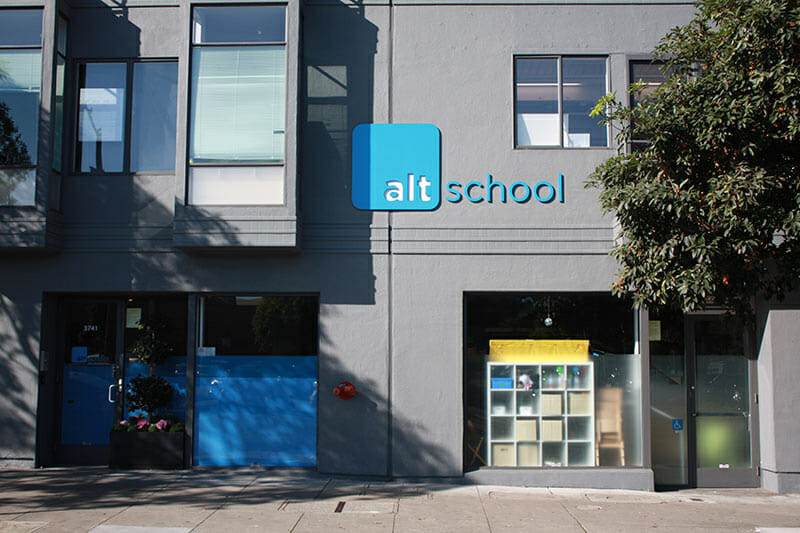
Articles
Industry News
Tech-Driven AltSchool Moves to Close Brick & Mortar Locations
By Cait Etherington
November 15, 2017
AltSchool, which was just getting off the ground a few years ago, has announced that it will soon close several of its alternative tech-driven brick-and-mortar schools to focus on software development. Now, investors and parents alike are wondering what went wrong and what is next for AltSchool.
The History of AltSchool
AltSchool got started back in 2013 when Max Ventilla, a former Google employee, started the school with five families and about 20 students ranging from five and 10 years. There were no standardized tests, grades, or traditional structures and the classes were small. Imagine an alternative school from the 1970s (remember the school without walls concept?) but in this case, add a lot of new technologies. Back in 2014, Carolyn Wilson, AltSchool’s Director of Education, told EdSurge,“Our intent was to create an education that really respected children and their capacity to drive their own learning.
 While the concept initially appeared viable, it has started to come undone. As recently reported by Adam Sataiano in BloombergTechnology, “Max Ventilla sold investors on a promise to build modern, technology-infused schools that would revolutionize education. The former Google executive convinced Mark Zuckerberg and prominent venture capitalists to commit $175 million to his startup, AltSchool. The company built at least nine grade schools in California and New York, some equipped with ceiling-mounted video cameras, an abundance of computers, custom apps, robots and 3D printers.” Just this past March, Ventilla told Fatherly, “It’s about the education being competency-based; it’s about the student having agency and responsibility in their own education, and it’s about the learning ultimately being able to transcend what happens within the 4 walls of the classroom to connect to the broader world.” But now AltSchool is losing money and showing few signs of becoming profitable in the future and Ventilla is changing tracks.
While the concept initially appeared viable, it has started to come undone. As recently reported by Adam Sataiano in BloombergTechnology, “Max Ventilla sold investors on a promise to build modern, technology-infused schools that would revolutionize education. The former Google executive convinced Mark Zuckerberg and prominent venture capitalists to commit $175 million to his startup, AltSchool. The company built at least nine grade schools in California and New York, some equipped with ceiling-mounted video cameras, an abundance of computers, custom apps, robots and 3D printers.” Just this past March, Ventilla told Fatherly, “It’s about the education being competency-based; it’s about the student having agency and responsibility in their own education, and it’s about the learning ultimately being able to transcend what happens within the 4 walls of the classroom to connect to the broader world.” But now AltSchool is losing money and showing few signs of becoming profitable in the future and Ventilla is changing tracks.
As reported in BloombergTechnology, “Despite charging about $30,000 for tuition, AltSchool’s losses are piling up as it spends at a pace of about $40 million per year. The San Francisco company is now scaling back its ambitions for opening elementary schools around the U.S. and will instead close at least one location. In an interview, Ventilla said it’s all part of the plan. The startup is shifting its focus to selling technology to other schools, a business which has struggled to date but that he said has a more promising future.”
Next Steps for AltSchool
At this time, AltSchool has plans to keep at least a few schools, located close to its New York and San Francisco offices, open but to to otherwise shift focus to selling its software to schools. Ventilla recently told EdSurge, “We will continue to move slow in a research and development mode, where our goal is to build deep partners and gradually expand the technology platform.” In another recent interview with BloombergTechnology, Ventilla emphasized that the current move had long been part of the company’s long-term plan. But can schools afford to buy into AltSchool’s technology?
According to one estimate, buying in will cost the average school $400 per student, which for many schools may simply be too steep a price to pay. That said, Ventilla’s vision remains bold. As the founder of AltSchool said in a recent interview, AltSchool was never about e-learning or just handing kids a computer or tablet: “Part of our motivation and what we see as an opportunity as ‘technologists engaged in education’ is not to just create some app or incremental functionality that superficially changes the experience. Rather, we’re creating a kind of backbone by which content and services and other technologies can make their way into the average classrooms over time and be used for students and educators to interact with each other in a more directed way.”









No Comments